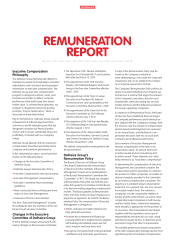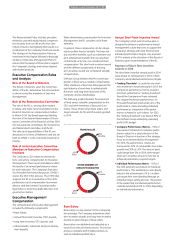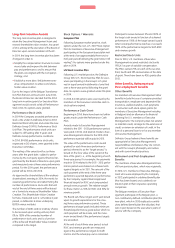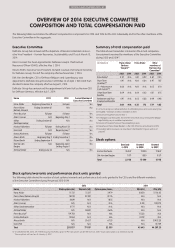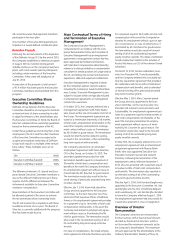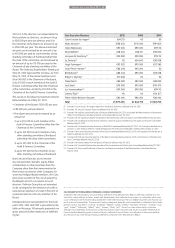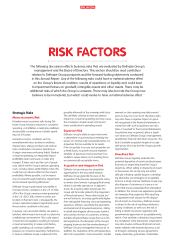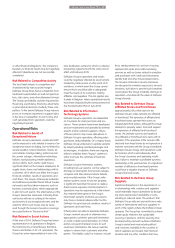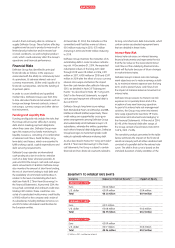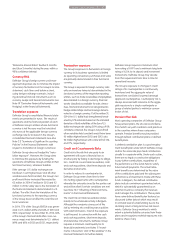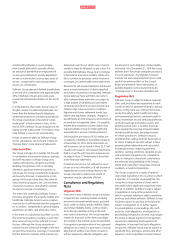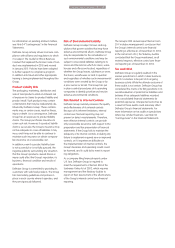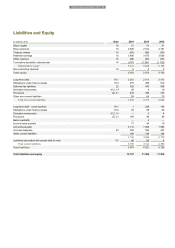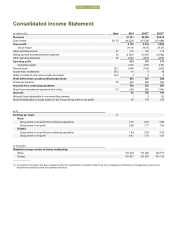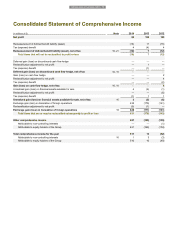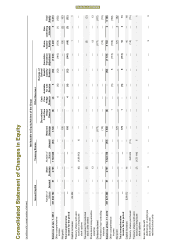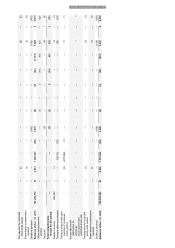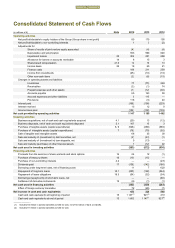Food Lion 2014 Annual Report Download - page 70
Download and view the complete annual report
Please find page 70 of the 2014 Food Lion annual report below. You can navigate through the pages in the report by either clicking on the pages listed below, or by using the keyword search tool below to find specific information within the annual report.
A defined benefit plan is a post-employ-
ment benefit plan which normally defines
an amount of benefit that an employee will
receive upon retirement, usually dependent
on one or more factors such as age, years of
service, compensation and/or guaranteed
returns on contributions.
Delhaize Group operates defined benefit plans
at several of its companies and approximately
24% of Delhaize Group’s associates were
covered by defined benefit plans at the end of
2014.
If, at the balance sheet date, the fair value of
the plan assets of a defined benefit plan, are
lower than the defined benefit obligations
(determined based on actuarial assumptions),
the Group would bear a theoretical “under-
funding risk” at that moment in time. At the
end of 2014, Delhaize Group recognized a net
liability of €135 million (2013: €117 million; 2012:
€136 million) to cover such underfunding.
Details on pension plans at Delhaize Group
and its subsidiaries can be found in Note 21.1
”Pension Plans” in the Financial Statements.
Insurance Risk
The Group manages its insurable risk through
a combination of external insurance coverage
and self-insurance. Delhaize Group uses
captive self-insurance program to provide
flexibility and optimize costs. In deciding
whether to purchase external insurance or
self-insure, the Group considers the frequency
and severity of losses, its experience in miti-
gating risk through safety and other internal
risk prevention programs, the cost and terms
of external insurance, and whether external
insurance coverage is mandatory.
The main risks covered by Delhaize Group’s
insurance programs are property, liability and
healthcare. Delhaize America uses a captive
structure for its self-insured retention programs
for its workers’ compensation, general liability,
automotive accident, and pharmacy claims.
In the event of a substantial loss there is a risk
that external insurance coverage or self-insur-
ance reserves may not be sufficient to cover
the loss. Although the Group assesses an
external insurer’s financial strength at the time
we purchase insurance coverage, it is possible
that the financial condition of the insurer may
deteriorate over time in which case it may be
unable to meet its obligation to pay a loss. It is
possible that Delhaize Group, due to changes
in financial or insurance markets, will be una-
ble to continue to purchase certain insurance
coverages on commercially reasonable terms.
Reserves for self-insured retentions are based
upon actuarial estimates of claims reported
and claims incurred but not reported. Delhaize
Group believes these estimates are reason-
able, however these estimates are subject to
a high degree of variability and uncertainty
caused by such factors as future interest and
inflation rates, future economic conditions,
litigation and claims settlement trends, leg-
islative and regulatory changes, changes in
benefit levels and the frequency and severity of
incurred but not reported claims. It is possible
that the final resolution of some claims may
require Delhaize Group to make significant
expenditures in excess of existing reserves.
Self-insurance provisions of €152 million are
included as a liability on the balance sheet as
of December 31, 2014. More information on
self-insurance can be found in Note 20.2 “Self
Insurance Provisions” and related investments
held to cover the self-insurance exposure are
included in Note 11 “Investments in Securities”
to the Financial Statements.
If external insurance is not sufficient to cover
losses or is not collectable, or if self-insurance
expenditures exceed existing reserves, the
Group’s financial condition and results of
operation may be adversely affected.
Compliance and Regulatory
Risks
Litigation Risk
From time to time, Delhaize Group is involved
in legal actions, including matters involving
personnel and employment issues, personal
injury, antitrust claims, product liability claims,
environment liability claims, contract claims
and other proceedings arising in the ordi-
nary course of business. The Group regularly
reviews its exposure to the claims and litiga-
tion arising in the normal course of operations.
It recognizes a provision when it has a present
obligation as a result of a past event, it is prob-
able that an outflow of economic resources
will be required to settle the obligation, and
the amount of such obligation can be reliably
estimated. As of December 31, 2014 the Group
believes that it has made adequate provisions
for such exposures. Any litigation, however,
involves risk and unexpected outcomes could
result in an adverse effect on the Group’s
financial statements. More information on
pending litigation can be found in Note 34
“Contingencies” in the Financial Statements.
Regulatory Risk
Delhaize Group is subject to federal, regional,
state, and local laws and regulations in each
country in which it operates relating to, among
others, zoning, land use, antitrust restrictions,
work place safety, public health and safety,
environmental protection, community right-to-
know, information security and data protection,
alcoholic beverage and tobacco sales, and
pharmaceutical sales. A number of jurisdic-
tions regulate the licensing of supermarkets,
including retail alcoholic beverage licenses.
In certain jurisdictions, Delhaize Group is
prohibited from selling alcoholic beverages in
its stores. Employers are also subject to laws
governing their relationship with associates,
including minimum wage requirements,
overtime, working conditions, disabled access
and work permit requirements. Compliance
with, or changes in, these laws could reduce
the revenues and profitability of the Group’s
stores and could affect its business, financial
condition, or results of operations.
The Group is subject to a variety of antitrust
and similar legislation in the countries in which
it operates. In a number of geographies, the
Group has a large number of stores which
may make future significant acquisitions more
difficult. In addition, Delhaize Group is subject
to legislation in many of the jurisdictions in
which it operates relating to unfair competitive
practices and similar behavior. Delhaize Group
has been subject to and may in the future be
subject to allegations of, or further regula-
tory investigations or proceedings into, such
practices. Such allegations, investigations or
proceedings (irrespective of merit), may require
the Group to devote significant management
resources to defending itself against such
allegations. In the event that such allegations
are proven, Delhaize Group may be subject to
significant fines, damages, awards and other
expenses, and its reputation may be harmed.
RISK FACTORS


